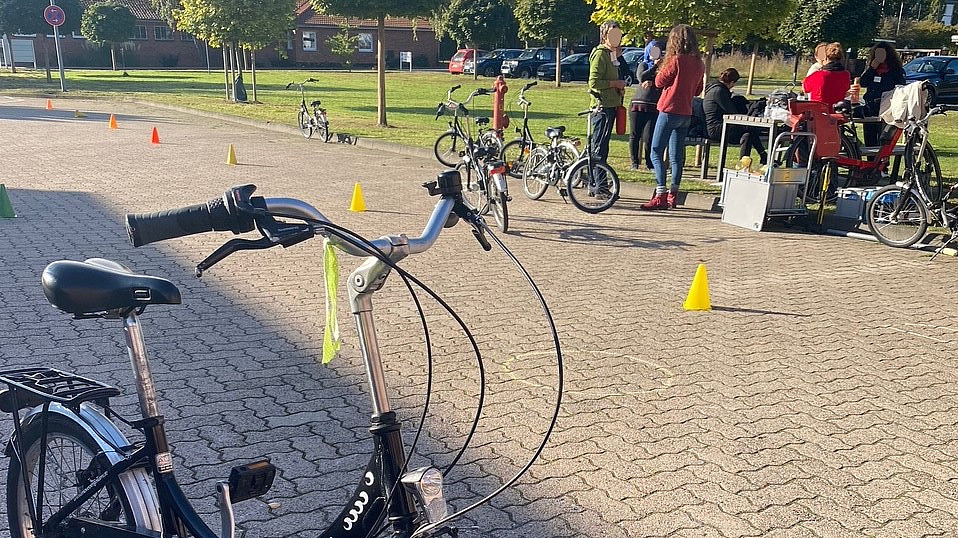This page contains automatically translated content.
"Social2Mobility": good practice for gender-equitable mobility
 Image: Franziska Kesper.
Image: Franziska Kesper.The study area of Social2Mobility is the city of Ronnenberg in the Hannover region. The quantitative survey of households at risk of poverty with at least one child under 18 years of age revealed that women at risk of poverty in the study area make significantly more trips by public transport, bicycle or on foot compared to men, use the car significantly less and have a car or a driver's license less often. The gender-specific discrepancy is particularly high for the frequency of pick-up and drop-off trips and thus for "mobility of caring." Women are significantly more likely to make accompanying trips, i.e., they are more likely to accompany children to daycare centers or parents to pharmacies. This gender-specific discrepancy is exacerbated by the risk of poverty.
On this basis, mobility-related measures were developed to improve the social participation of households with children at risk of poverty, which are now being implemented. For example, the personal feeling of safety when cycling is to be strengthened, among other things with inclusive bicycle courses or repair courses for different groups of people (e.g. courses in kindergartens/schools, culturally sensitive courses for adult women). Structural-infrastructural measures that can improve the subjective perception of safety in pedestrian and bicycle traffic have been developed. These redivide public space and dedicate more areas to non-motorized traffic. Furthermore, a free neighborhood ticket for public transport and a nightly on-demand women's night cab are among the measures developed. The free neighborhood ticket for public transport in the entire Hannover region, for example, was tested and evaluated as part of an experiment in the Reallabor.
As part of the lunchtalk series on 15.03.2022 of the "gerecht mobil" competition, project staff Franziska Kesper and Alena Fischer (University of Kassel, Department of Transport Planning and Systems) presented "Social2Mobilty" on behalf of the project team together with other good practice projects. In addition to this short presentation, the participants exchanged their approaches, challenges and focal points around the implementation of gender-equitable mobility.
In order to implement and evaluate the measures developed, the Social2Mobility project will enter a follow-up project within the implementation and continuation phase of the "Leading Initiative Future City" funded by the BMBF. Social2Mobility II has received a high funding priority for this and is expected to start on 01.04.2022 with a duration of 2 years. The project consortium will remain in place for the follow-up project: University of Kassel (Department of Transport Planning and Transport Systems), Goethe University Frankfurt am Main (Mobility Research Group), Region Hannover (Department of Transport and Staff Office Social Planning), WVI Prof. Dr. Wermuth Verkehrsforschung und Infrastrukturplanung GmbH from Braunschweig, City of Ronnenberg as well as other institutions and cooperation partners* in Ronnenberg.
"gerecht mobil" is a project of the LIFE Bildung Umwelt Chancengleichheit e.V. association in Berlin, which aims to make gender- and socially equitable mobility projects visible. To achieve this, a competition for gender equitable mobility projects was launched. The projects awarded in the competition show as good practice to what extent and where gender plays a role in everyday mobility and how gender justice can be taken into account in practice. "gerecht mobil" is funded by the Federal Environment Agency and the Federal Ministry for the Environment, Nature Conservation and Nuclear Safety.
Further information:
Contact:
M. Sc. Alena Fischer and M. Sc. Franziska Kesper
Department of Transportation Planning and Systems
Phone: +49 561 804-3281
E-Mail:
alena.fischer[at]uni-kassel[dot]de
franziska.kesper[at]uni-kassel[dot]de